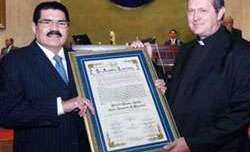“The light of morning revealed what the wild storm of the night had done. The glazed branches of trees weighted with crystal ice hung low over the snow-covered earth. I was glad to hear my father say that he would delay his milk delivery so that we children could ride to school with him. We dressed warmly against the wind-driven snow and sharp sleet that stung our faces. Climbing into the straw-filled box sleigh, we were on our way. I was glad that the horseshoes were filled with ice calks that kept the horses from slipping as they trotted along…
Now in the long, wintry December days of my retirement, I sit with closed eyes and take myself back to the pleasant days of my boyhood…It is said that it is foolish to live in the past, but what has modern life to offer with its anxieties, uncertainties, stress and strife?… In today’s troubled times, I embrace the memories of countless days in my carefree years as a barefoot boy … the long ago when my heart and life were free of worry and want, unshackled by the pressures of time and the problems of progress.”
 Those lines from his most recent book could serve as a signature for Bernard Majewski, an 85-year-old parishioner at St. Stanislaus Church in Amsterdam who is a chronicler of the life and times of Montgomery and Fulton counties here in upstate New York.
Those lines from his most recent book could serve as a signature for Bernard Majewski, an 85-year-old parishioner at St. Stanislaus Church in Amsterdam who is a chronicler of the life and times of Montgomery and Fulton counties here in upstate New York.
Majewski’s prose rambles along like the winding dirt roads and lazy streams he is so fond of. He is a country journalist, writing diary-like tales of local lore and customs with a poet’s eye for nature’s beauty and a moralist’s distress about the soul of the republic and the fate of the earth.
His parents and grandparents came from Poland in the 1880s, and Majewski (pronounced My-EF-ski) was born in 1907 on their farm in Stone Ridge, located along Route 5S, west of Fonda. His roots have sunk deep and spread wide in the soil of the Mohawk Valley.
“I never went anywhere,” he said last week. “I don’t have any education—seventh grade, that’s about it. I came from a big family. There were 12 of us, and my mother said I had to go to work because she needed more income for the family. So I had to get out of the seventh grade at St. Stanislaus [Catholic School] and I never got back.”
As a teenager, Majewski worked in the busy mills and factories of Amsterdam in a melting pot of immigrants—Poles, Dutch, Germans, Irish, and Scots.
“In those days, there were jobs galore; I could quit one job in the morning and have another in the afternoon,” he said. “I worked 54 hours in a rug mill and got $14.32 a week in pay, which I gave to my mother—except for ten cents. In those days, a dime went a long way; you could go see a movie.”
Today, Majewski lives with his wife of 57 years in a small, weatherbeaten farmhouse on 50 acres outside of Amsterdam, a home they bought during the Second World War.
He is a slight, baldish man with ruddy skin and pale eyes. An engaging conversationalist, he likes to talk to visitors while leafing through the well-thumbed, worn leather scrapbooks which hold his life in writing.
“In your youth, you have ideas. You want to do things, be things,” he said, describing his ambitions to be a priest, an artist, an inventor, and a journalist.
As it turned out, he split his time between the factories and working his family farm. With his wife and two daughters, he bred rabbits and chinchilla for sale to furriers, and raised fruits and vegetables, poultry and milk cows.
He did his writing and drawing in his spare time, composing several chapbooks, mostly for the eyes of his family and friends. Today, he writes a regular senior citizens’ column for The Amsterdam Recorder. His most recent self-published work is a 221-page memoir of one year in his youthful life, Memories of My Barefoot Days Around Countryside Stone Ridge.
The book is filled with moments frozen in time, little happenings that would have gone unnoticed and unremembered if it were not for Majewski’s attentive eye. “In my early life, I learned that neither time nor season could be rushed,” he writes. “I learned to take time in stride, not race it.”
In his slow, quiet way, Majewski charts the rhythms of rural immigrant life in the 1910s. The sounds of phoebes and chickadees are recalled, and the smell of applewood, and the loping play of a red fox in a clearing. He lovingly describes his mother’s kitchen and her baking potatoes, slipping the spuds under the hot ash in the fireplace.
He tells of the excitement of holding hands with a sweetheart on a sleighride and afterward warming up with hot cocoa, homemade doughnuts and biscuits layered with honey and butter.
From his family, he was taught to believe that everything came from God, and that there was a moral order and purpose in the universe. “We had a good Catholic education at home,” he said.
Days on the farm began and ended with prayer, and each Sunday the family would travel six miles by horse and buggy to attend Mass at St. Stanislaus, which his father had helped to build.
Disenchanted with Progress
Though he may not have become a priest, his writings flow with praises of “God’s wonderful plan” and jeremiads in defense of “the meek, the poor and humble who become puppets of the overlording few that want to compress this humanity into a capsule of slavery.”
He is thoroughly disenchanted with the modern belief in progress, especially the way technology and economics conspired to destroy the old landmarks and natural patterns of life in the Mohawk Valley.
“Is it a good progress,” he asked, “when we’ve got everything—television, fast cars, a lot of money and food—but the jobs aren’t here anymore? People don’t laugh the way they used to and they don’t believe in anything.”
In his youth, he said, “America held so much to look forward to.” But today, the country looks old, weary and worn, from Majewski’s perspective. He sees a new breed of American, not the rugged immigrant pioneers of the past, but a new generation driven by the pursuit of recreation, speed and convenience.
“Today, our nation under God is becoming a nation of science governed by too many bureaucratic notions with too many expressions that ‘God is dead,’ and in this belief [the nation] is in danger of perishing,” he writes in his new book. “The heritage that was gained through struggle and sacrifice will be jeopardized and will be in danger of losing the liberties we love so much.”
At 85, Bernie Majewski shows no signs of letting up. His next book, which he is currently at work on, will record his vision of God and the kingdom of heaven.
He insists, in a most serious manner and in defiance of all current medical wisdom, that the secret of a long life is a diet that avoids processed foods and is rich in whole milk, eggs, butter and fats. It is hard to argue with him after seeing that he has just shoveled a foot of snow off a driveway the size of a football field.
“I can get up in the morning with a prayer on my lips or maybe I’ll hum,” he says. “My wife keeps asking, ‘What’re you so happy about?’ And I say, ‘It’s a new day, so much to look forward to.’ I don’t begrudge my life or any day in my life. I take it as it comes along.”
First published in The Evangelist (February 25, 1993)
© David Scott, 2009. All rights reserved.


